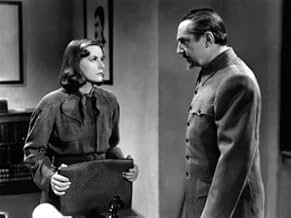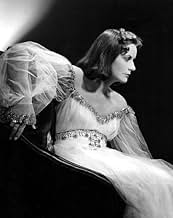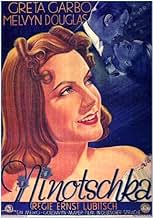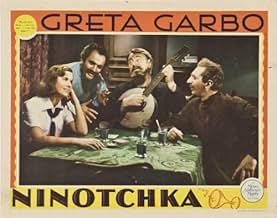AVALIAÇÃO DA IMDb
7,8/10
24 mil
SUA AVALIAÇÃO
Uma mulher russa intransigente é enviada a Paris para tratar de assuntos oficiais, sente-se atraída por um homem que representa tudo o que ela supostamente detesta.Uma mulher russa intransigente é enviada a Paris para tratar de assuntos oficiais, sente-se atraída por um homem que representa tudo o que ela supostamente detesta.Uma mulher russa intransigente é enviada a Paris para tratar de assuntos oficiais, sente-se atraída por um homem que representa tudo o que ela supostamente detesta.
- Direção
- Roteiristas
- Artistas
- Indicado a 4 Oscars
- 5 vitórias e 6 indicações no total
Dorothy Adams
- Swana's Maid
- (não creditado)
Monya Andre
- Gossip
- (não creditado)
Nino Bellini
- Swana's Restaurant Guest
- (não creditado)
Wilda Bennett
- Swana's Restaurant Guest
- (não creditado)
Eumenio Blanco
- Waiter
- (não creditado)
Symona Boniface
- Gossip
- (não creditado)
Tex Brodus
- Club Patron
- (não creditado)
Avaliações em destaque
10arelx
I see that Billy Wilder collaborated on this. Was it a studio decision that Garbo wasn't cast as a comedienne? From the evidence in this film, she should have been. Her timing is excellent, her delivery very special. This is a gem I'd never seen that deserves its National Registry status. In 1939 the Soviet Union had sympathizers in the US, and during the coming World War it was an ally. This gentle spoof of Soviet seriousness and self-conscious worker ethics foreshadows the arguments that were later trotted out after the War to begin the Cold War, but here the humor and satire are soft, more Noel Coward than propaganda.
My lament is not seeing more comedy from Garbo. She made such serious and tragic films, when she could have been making us laugh. The film is dated, yes, but Garbo herself shines through along with her three Russian accomplices. I think that Billy Wilder and Garbo would have been a great team
My lament is not seeing more comedy from Garbo. She made such serious and tragic films, when she could have been making us laugh. The film is dated, yes, but Garbo herself shines through along with her three Russian accomplices. I think that Billy Wilder and Garbo would have been a great team
Three Russian traders come to Paris to negotiate the jewels of a former Grand Duchess of the Russian empire. The former owner of the jewels, Grand Duchess Swana (Ina Claire), is exiled in Paris, and try to retrieve the possession through the French justice. Her lawyer and lover, Count Leon d'Algout (Melvyn Douglas), advises the Russians to wait for the sentence of the justice. Meanwhile, the Russian supervisor Nina Ivanovna Yakushova "Ninotchka" (Greta Garbo)" is sent to Paris to survey and evaluate the performance of the negotiators, and incidentally meets Count Leon d'Algout. They feel initially attracted for each other, and later they fall in love for each other. However, the Grand Suchess becomes jealous and their love become impossible due to the Russian closed political system. "Ninotchka" is a delightful romantic comedy and funny satire to the fight of classes. The chemistry between Melvyn Douglas, who has a magnificent performance, and Greta Garbo, gorgeous as usual, is amazing. The confrontation between the capitalism and socialism systems is exaggerated, labeled and caricatured, but very funny, provoking many laughs. My vote is nine.
Title (Brazil): "Ninotchka"
Title (Brazil): "Ninotchka"
An expertly-played and presented comedy that continues to be dogged by detractors for the oddest reasons. Some feel NINOTCHKA suffers compared to Lubitsch's earlier work, finding it formulaic alongside 1933's TROUBLE IN PARADISE. (I hadn't known Lubitsch had been given 'do-what-thou-wilt' privileges from the Hays Office - I'd labored under the delusion he faced the same restrictions in content and tone every other moviemaker did in 1939.) Other nay-sayers decry the film's jabs at Soviet collectivism as 'dated' if not 'unenlightened'. (Huh? You mean show trials and forced starvation of kulaks were GOOD things that a truly witty screenplay would celebrate?) Still other kibitzers squawk over the casting, of all things! (While it IS fun to picture William Powell or Robert Montgomery in the role of Leon, the boulevardier, Melvyn Douglas was never better than he is here. If he has his spotty moments, it's in those scenes where he must swoon with ardor, reciting dialogue that rings a tad purple to the ear; it's quite possible Powell or Montgomery would have fared even worse reading those lines.) Okay, enough defense - now let's go to NINOTCHKA's numerous strengths. Garbo is magnificent; she has a real knack for comedy (her deadpan entrance is hilarious) yet, as always, is able to break your heart with a look, a word, a gesture. Her three 'stooges' (Sig Rumann, Alexander Granach & Felix Bressart) are broadly funny and genuinely endearing. Ina Claire is everything her legend always claimed she was - though her character is icily calculating, you can't hate any woman who can make dialogue bristle like this. Lubitsch is in complete command throughout; his staging and pacing of the proceedings, masterful in its seeming effortlessness. Even the storied Metro glitz shines in NINOTCHKA, right down to the brilliant artifice of Cedric Gibbons' art direction (the Eiffel Tower sets especially). Last but not least is the superb screenplay by (among other hands) the team of Charles Brackett & Billy Wilder. Wisely, their satiric darts are dipped in a curare leavened by wit and sentiment, and while they are thrown with accuracy, their sting is never such that the satire sinks into the mire of political ideology. NINOTCHKA, after all, is about the triumph of love over politics, and to those who feel trapped in the prevailing toilet-ethic of the Farrelly Brothers' blood-poisoning of modern comedy, represents a much-needed antidote. Inoculate yourself at your earliest opportunity.
My all-time favorite comedy! All right, I am a Garbo fan regardless of the role, and I happen to think that Melvyn Douglas was perfectly cast here. In fact, the entire cast excels, without exception, in one of Lubitsch's finest and most elegant films. Those who think that lines like "The show trials were a great success...there are now fewer, but better, Russians" are dated, or that making fun of totalitarianism is tasteless and politically incorrect need to lighten up. Garbo is not only very funny in this classic, she is inexpressibly lovely (as always). A must-see for any lover of beautifully crafted and entertaining film comedies.
While it's a given that Greta Garbo was the most enigmatic of film stars during Hollywood's golden age, it's also fair to state that she may be the least relevant today for her austere beauty and cool, sometimes unapproachable demeanor. Yet, all that is erased with this 1939 comedy masterwork which brilliantly teams her with the master of innuendo-filled scintillation, Ernst Lubitsch. With a laser-sharp, witty script by Walter Reisch, Charles Brackett and Billy Wilder (before he became a master director himself), this classic is one part political comedy, one part screwball farce and one part romantic whimsy, all blended impeccably with the famous Lubitsch touch.
The plot involves Nina Ivanovna Yakushova, a Soviet envoy sent to Paris to ensure that the government receives the proceeds from the sale of jewels once owned and still coveted by the Grand Duchess Swana, now an expatriate. The cold, emotionless envoy goes about superseding the three lesser envoys who have been assimilating themselves into the frivolous, capitalistic world of Paris thanks to Count Leon, a tuxedoed dandy and the duchess's constant escort. It is Leon who dubs the envoy Ninotchka, and after initial resistance, the two find themselves falling in love but not at the expense of her convictions about the omnipotence of Communist values. The jewels become a negotiation ploy that complicates their affair as does the Grand Duchess herself. The plot develops in unexpected ways and through such clever observational humor that the ending comes all too soon.
While she is deified by many for the operatic tragedy of "Camille" and the mannered mystique of "Mata Hari", Garbo seems at first to be a parody of her sullen screen image with witty one-liners delivered in hilarious deadpan, but she, like her character, blossoms into a warm, comically romantic presence as the film progresses. It's a wondrous transformation and the one performance that assures Garbo her lasting stature more than any other. As Leon, Melvyn Douglas specialized in William Powell-knockoff roles like this one and while he does get a bit excessive in his 1930's-style romantic gestures, he is sophisticated and genial enough to have us believe Ninotchka may give up Mother Russia for him.
At first, stage legend Ina Claire seems like she will play the Grand Duchess Swana as a dotty ninny, but when her talons show, she is an excellent match for Garbo in their scenes together. As the trio of envoys ensconced in the good life, Sig Ruman, Felix Bressart and Alexander Granach make a merry chorus to the proceedings. I particularly like the scenes back in Russia when they share an omelet dinner with Ninotchka in her Soviet-sanctioned, multiple-occupant room. The print transfer on the 2005 DVD is pristine and brings out William Daniels' sparkling, black-and-white cinematography, though the only extra is the film's original trailer. This is truly a must-see.
The plot involves Nina Ivanovna Yakushova, a Soviet envoy sent to Paris to ensure that the government receives the proceeds from the sale of jewels once owned and still coveted by the Grand Duchess Swana, now an expatriate. The cold, emotionless envoy goes about superseding the three lesser envoys who have been assimilating themselves into the frivolous, capitalistic world of Paris thanks to Count Leon, a tuxedoed dandy and the duchess's constant escort. It is Leon who dubs the envoy Ninotchka, and after initial resistance, the two find themselves falling in love but not at the expense of her convictions about the omnipotence of Communist values. The jewels become a negotiation ploy that complicates their affair as does the Grand Duchess herself. The plot develops in unexpected ways and through such clever observational humor that the ending comes all too soon.
While she is deified by many for the operatic tragedy of "Camille" and the mannered mystique of "Mata Hari", Garbo seems at first to be a parody of her sullen screen image with witty one-liners delivered in hilarious deadpan, but she, like her character, blossoms into a warm, comically romantic presence as the film progresses. It's a wondrous transformation and the one performance that assures Garbo her lasting stature more than any other. As Leon, Melvyn Douglas specialized in William Powell-knockoff roles like this one and while he does get a bit excessive in his 1930's-style romantic gestures, he is sophisticated and genial enough to have us believe Ninotchka may give up Mother Russia for him.
At first, stage legend Ina Claire seems like she will play the Grand Duchess Swana as a dotty ninny, but when her talons show, she is an excellent match for Garbo in their scenes together. As the trio of envoys ensconced in the good life, Sig Ruman, Felix Bressart and Alexander Granach make a merry chorus to the proceedings. I particularly like the scenes back in Russia when they share an omelet dinner with Ninotchka in her Soviet-sanctioned, multiple-occupant room. The print transfer on the 2005 DVD is pristine and brings out William Daniels' sparkling, black-and-white cinematography, though the only extra is the film's original trailer. This is truly a must-see.
Você sabia?
- CuriosidadesBela Lugosi received fourth billing even though he appears only near the end of the movie and only in one scene with Greta Garbo.
- Erros de gravaçãoWhen Ninotchka tells a funny story, objects on the desk change positions.
- Versões alternativasAlso available in a computer colorized version.
- ConexõesEdited into Hollywood: The Dream Factory (1972)
Principais escolhas
Faça login para avaliar e ver a lista de recomendações personalizadas
- How long is Ninotchka?Fornecido pela Alexa
Detalhes
Bilheteria
- Orçamento
- US$ 1.365.000 (estimativa)
- Faturamento bruto mundial
- US$ 2.477
- Tempo de duração1 hora 50 minutos
- Cor
- Proporção
- 1.37 : 1
Contribua para esta página
Sugerir uma alteração ou adicionar conteúdo ausente






































